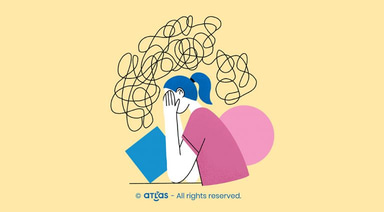Management of fear, dreads, or worries, regardless of what name you know these deep states of unrest, it is necessary to acquire it from their onset. First of all, you need to know that we all went through them at least once in a lifetime. What can lead to uncontrollable conditions of disorder is:
- an important exam,
- a new relationship with a partner,
- an interview,
- a new job,
- an important decision (that affects the trajectory of life.)
Why is this happening? Because this is the body’s way of struggling with a real or imaginary danger.
What are the fears?
Fears are primary emotions that have a protective role in cases of reality or not, being different from anxiety states. Fear can also translate for some people as a lack of courage, thus defending the vulnerability in situations that happen outside the comfort zone.
Each of us feels these fears differently:
- can easily take the form of sensations of emptiness in the stomach or even pain,
- can change the heart rate,
- can suddenly increase or decrease body temperature,
- palms can sweat uncontrollably, or can also reach an advanced state of paralysis, such as loss of ability to speak or move on short intervals, strictly in those situations.
But what happens to the body when fear encompasses it?
To know that the fears act first and foremost at the mental level, specifically in the area of the brain. Here a center of reaction to emotion, called the cerebral amygdala, represents an essential pawn in this story.
The name of the amygdala (in the Greek), comes from the almond word because it has the size close to that of an almond. It is essential in deciding emotions, especially external stimuli, that can pose a threat to us. The cerebral amygdala controls the autonomous reactions associated with fear. It has the vital task of preparing us for potential danger. At the same time, it helps us decide which can be the best way to respond and react to these threats.
The same brain center that responds to emotions has the power to influence human behaviors, playing a decisive role in creating new experiences related to fear. Correctly, these behaviors can translate through loss of food desire or lack of interest in trying new things.
How do we tackle the situation? 9 ways you can overcome your daily fear
Fear is indispensable in some cases because it can be an excellent survival mechanism for the body. Unfortunately, however, most of the time, it is also destructive. The ability to control and to be master of the situation, only and only by the person concerned. What can you do to “get your Diploma in the management of fear/fears”?
Here are at least nine ways you can try to control them yourself, but a psychotherapy specialist will always be a real help in fighting these fears. He will be able to help you discover new angles of addressing these states of restlessness and certainly will be the right partner on this journey.
1. Give yourself some time
It is impossible to have a clear judgment when you are full of fear or anxiety. The first and first thing you can do is give yourself in these situations a few good minutes, to think as clearly as possible the following moves. You can take a short walk, yoga, or why not, drink a cup of your favorite tea.
2. Breathe
It’s easy for us to breathe. But only in theory because in practice, we are not so good at this chapter. When breathing correctly, the brain vascularizes and fatigue or even stress, can be improved by daily breathing exercises. After you learn the proper breathing technique (for example, by placing your palm on your stomach and take deep breaths), your heart rate can calm down, and sweaty palms can return to their original condition.
The goal is to help your mind cope with the panic by the power of habit.
3. Face your Fears
If you avoid the fears continuously, they will become deeper and more frightened. Whatever the situation you’re facing, try not to run away from it and face it. Whatever your fear, if you face it, you should start to diminish it.
4. Imagine the worst possible scenario
Think of the worst things that can happen in a given situation. Maybe you’re panicking or even having a heart attack. A fictitious one, of course, because it is not possible to produce itself at that time. Fear will run faster than you can run it.
5. Ask Around
If you have a phobia, like, the fear of getting stuck in the elevator, whose result would be suffocation, ask around if something like this could really happen. Or think about what advice you would give a friend if this happened to him.
6. Do not try to be perfect
Life isn’t perfect. Why would you try to be? There will always be good days and less good days, try to enjoy every moment.
7. Imagine a place of story
Take a break from all your daily activities, close your eyes and imagine a place where you could be safe and thrilled. It could be a beach, a mountain, or even in your bed.
8. Talk about your fears
Sharing is caring:). The opportunity to talk to someone about your worries may be the most important thing. Whether we talk about a family member or a friend, whether we’re talking about a specialist in psychotherapy. However, the latter may be the best option. Especially if relationships with loved ones are not the best.
9. Reward yourself
Not, at last, give yourself a gift. When you noticed that you took one more step for your benefit, it’s time to celebrate your success through a joy. It can be a dinner in the city, a good book, a 2-day trip to the mountains, etc. The Important thing is to recognize your merit and try to be better about the management of your fears.
You can also track Karen Thompson Walker in TEDx events, which talks about “what fear can teach us.” You may be able to draw some conclusions to help you in the future. Good luck!



